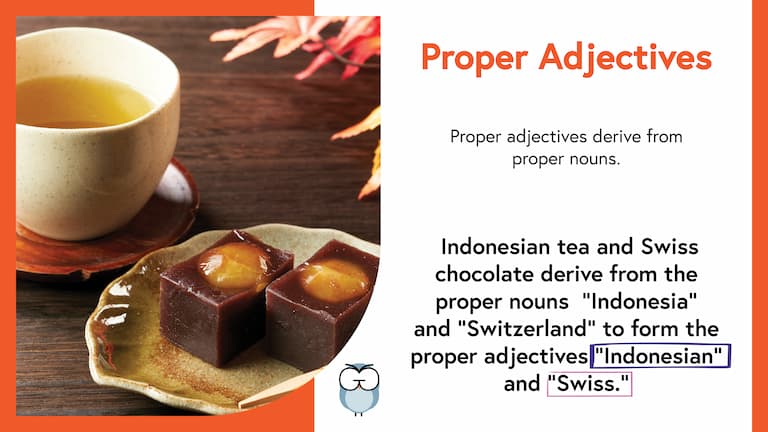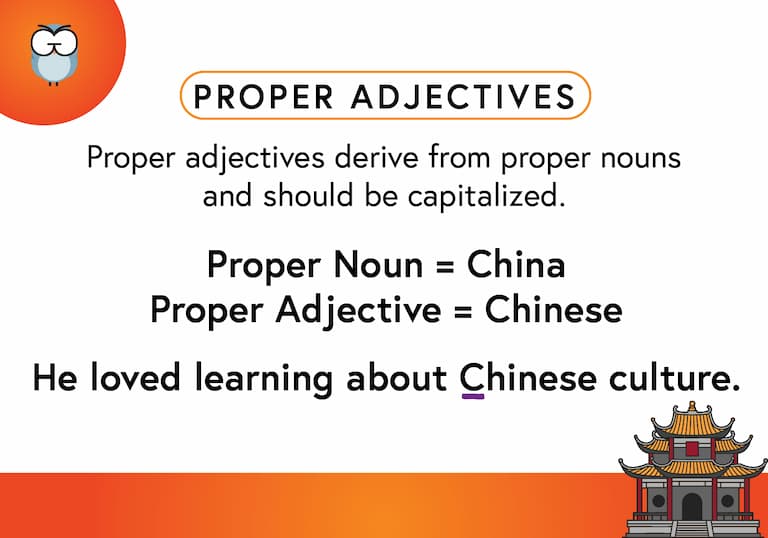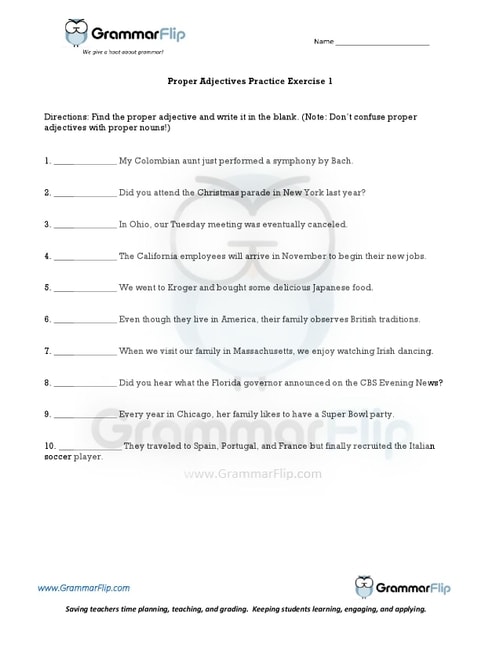What is a Proper Adjective?
A proper adjective is a grammatical part of speech that derives itself from a proper noun. For instance, “China” is a proper noun; it is the name of a country. The word “Chinese” is an adjective (specifically, a proper adjective) because it is used to describe a noun, as in “Chinese food.” Because proper adjectives derive themselves from proper nouns (which are capitalized), proper adjectives should be capitalized.
Some examples of proper adjectives would be the following:
The Italian minister visited our country.
(notice the proper adjective “Italian” describes the noun “minister”)
We saw Shakespearean actors!
(notice the proper adjective “Shakespearean” describes the noun “actors”)
African drums are lots of fun to play.
(notice the proper adjective “African” describes the noun “drums”)
Long-Form Video: Proper Adjectives
Long-form instructional video lessons allow students to engage with grammar concepts in more depth and detail.
This format provides students with a stronger foundation and a more comprehensive understanding of proper adjectives.
Grammar-in-Context Video: Proper Adjectives
GrammarFlip’s grammar-in-context videos provide an additional layer of instruction, learning, and relatability.
Our unique and memorable video footage helps solidify the understanding of challenging grammar concepts.
Watch this video to better understand proper adjectives!
Short-Form Video: Proper Adjectives
Short-form videos are an excellent way to review grammar concepts. Our two-minute instructional videos help students review the concept of proper adjectives to further solidify their understanding.
Memorable Image: Proper Adjectives
The use of images to connect visual cues with concepts makes it simpler for students to grasp and remember key ideas. GrammarFlip’s memorable images create visual associations that make proper adjectives more engaging and easier to retain.

Definition Cards: Proper Adjectives

Definition cards reinforce grammar concepts by providing clear and concise explanations that students can easily reference for quick review and better retention. GrammarFlip’s definintion cards help students review the concept of proper adjectives to further solidify their understanding.
Why You Should Use Proper Adjectives in Your Writing
Similar to common adjectives, proper adjectives help your writing to be more accurate and precise. Notice the difference between the two following sentences:
We went to the theater to watch an old play.
We went to the theater to watch a Shakespearean play.
Notice a difference? The second sentence is much more precise in that specifies the playwright: Shakespeare. Because “Shakespeare” (a proper noun) is being used to describe the play (ie, it’s functioning as an adjective), it’s referred to as a proper adjective.
Use proper adjectives when you can, and you’ll provide your reader with much more clarity. Also, keep in mind that there are a variety of other adjective types, such as common adjectives, demonstrative adjectives, possessive adjectives, indefinite adjectives, and interrogative adjectives just to name a few. Be sure you understand the differences between them all.
Download a Free Worksheet on Proper Adjectives!
Click the image below to download your free worksheet on proper adjectives!

Do your students confuse proper adjectives with common adjectives?
Explore More GrammarFlip Lessons!
Parts of Speech lessons provide the building blocks of grammar. GrammarFlip covers these topics in detail to ensure a solid foundation is built. First time learners and students seeking to review the parts of speech can both benefit from the instructional videos and slide show reviews.
Parts of the Sentence lessons are critical for understanding how the parts of speech function in language construction. From the basic to the advanced, these lessons will cover a wide range of grammar topics that can be used in any grade level or classroom.
Mechanics and Usage lessons equip students with the necessary skills to communicate clearly to all audiences. With a focus on the application of these concepts in student writing, these lessons tie together both simple constructions of grammar as well as the more complex such that any age or skill level of student will benefit.


